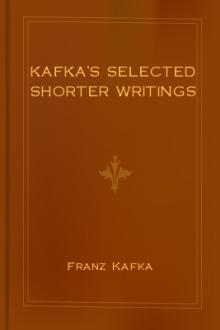Kafka's Selected Shorter Writings by Franz Kafka (list of ebook readers txt) 📕

- Author: Franz Kafka
- Performer: -
Book online «Kafka's Selected Shorter Writings by Franz Kafka (list of ebook readers txt) 📕». Author Franz Kafka
Selected shorter writings
by Franz Kafka
Translated by Ian Johnston
Before the Law
The Hunter Gracchus
Up in the Gallery
An Imperial Message
Jackals and Arabs
The Kafka texts below are new translations prepared by Ian Johnston of Malaspina University-College, Nanaimo, BC, Canada. They are all in the public domain and may be used without charge and without permission, provided the source is acknowledged, released November 2003.
Printed chapbooks containing these stories will soon be available from Prideaux Street Publications at a cost of $2.00 (Canadian) each. For information please check Prideaux Street Publications. These books are suitable for class room use.
For questions and comments please contact Ian Johnston.
Before the Law
Before the law sits a gatekeeper. To this gatekeeper comes a man from the country who asks to gain entry into the law. But the gatekeeper says that he cannot grant him entry at the moment. The man thinks about it and then asks if he will be allowed to come in later on. "It is possible," says the gatekeeper, "but not now." At the moment the gate to the law stands open, as always, and the gatekeeper walks to the side, so the man bends over in order to see through the gate into the inside. When the gatekeeper notices that, he laughs and says: "If it tempts you so much, try it in spite of my prohibition. But take note: I am powerful. And I am only the most lowly gatekeeper. But from room to room stand gatekeepers, each more powerful than the other. I can't endure even one glimpse of the third." The man from the country has not expected such difficulties: the law should always be accessible for everyone, he thinks, but as he now looks more closely at the gatekeeper in his fur coat, at his large pointed nose and his long, thin, black Tartar's beard, he decides that it would be better to wait until he gets permission to go inside. The gatekeeper gives him a stool and allows him to sit down at the side in front of the gate. There he sits for days and years. He makes many attempts to be let in, and he wears the gatekeeper out with his requests. The gatekeeper often interrogates him briefly, questioning him about his homeland and many other things, but they are indifferent questions, the kind great men put, and at the end he always tells him once more that he cannot let him inside yet. The man, who has equipped himself with many things for his journey, spends everything, no matter how valuable, to win over the gatekeeper. The latter takes it all but, as he does so, says, "I am taking this only so that you do not think you have failed to do anything." During the many years the man observes the gatekeeper almost continuously. He forgets the other gatekeepers, and this one seems to him the only obstacle for entry into the law. He curses the unlucky circumstance, in the first years thoughtlessly and out loud, later, as he grows old, he still mumbles to himself. He becomes childish and, since in the long years studying the gatekeeper he has come to know the fleas in his fur collar, he even asks the fleas to help him persuade the gatekeeper. Finally his eyesight grows weak, and he does not know whether things are really darker around him or whether his eyes are merely deceiving him. But he recognizes now in the darkness an illumination which breaks inextinguishably out of the gateway to the law. Now he no longer has much time to live. Before his death he gathers in his head all his experiences of the entire time up into one question which he has not yet put to the gatekeeper. He waves to him, since he can no longer lift up his stiffening body. The gatekeeper has to bend way down to him, for the great difference has changed things to the disadvantage of the man. "What do you still want to know, then?" asks the gatekeeper. "You are insatiable." "Everyone strives after the law," says the man, "so how is that in these many years no one except me has requested entry?" The gatekeeper sees that the man is already dying and, in order to reach his diminishing sense of hearing, he shouts at him, "Here no one else can gain entry, since this entrance was assigned only to you. I'm going now to close it."
The Hunter Gracchus
Two boys were sitting on the wall by the jetty playing dice. A man was reading a newspaper on the steps of a monument in the shadow of a hero wielding a sabre. A young girl was filling her tub with water at a fountain. A fruit seller was lying close to his produce and looking out to sea. Through the empty openings of the door and window of a bar two men could be seen drinking wine in the back. The landlord was sitting at a table in the front dozing. A small boat glided lightly into the small harbour, as if it were being carried over the water. A man in a blue jacket climbed out onto land and pulled the ropes through the rings. Behind the man from the boat, two other men in dark coats with silver buttons carried a bier, on which, under a large silk scarf with a floral pattern and fringe, a man was obviously lying.
No one bothered with the newcomers on the jetty, even when they set the bier down to wait for their helmsman, who was still working with the ropes. No one came up to them, no one asked them any questions, no one took a closer look at them.
The helmsman was further held up a little by a woman with disheveled hair, who now appeared on deck with a child at her breast. Then he came on, pointing to a yellowish two-story house which rose close by, directly on the left near the water. The bearers took up their load and carried it through the low door furnished with slender columns. A small boy opened a window, noticed immediately how the group was disappearing into the house, and quickly shut the window again. The door closed. It had been fashioned with care out of black oak wood. A flock of doves, which up to this point had been flying around the bell tower, came down in front of the house. The doves gathered before the door, as if their food was stored inside the house. One flew right up to the first floor and pecked at the window pane. They were brightly coloured, well cared for, lively animals. With a large sweep of her hand the woman on the boat threw some seeds towards them. They ate them up and then flew over to the woman.
A man in a top hat with a mourning ribbon came down one of the small, narrow, steeply descending lanes which led to the harbour. He looked around him attentively. Everything upset him. He winced at the sight of some garbage in a corner. There were fruit peels on the steps of the monument. As he went by, he pushed them off with his cane. He knocked on the door of the house, while at the same time taking off his top hat with his black-gloved right hand. It was opened immediately, and about fifty small boys, lined up in two rows in a long corridor, bowed to him.
The helmsman came down the stairs, met the gentleman, and led him upstairs. On the first floor he accompanied him around the slight, delicately built balcony surrounding the courtyard, and, as the boys crowded behind them at a respectful distance, both men stepped into a large cool room at the back. From it one could not see a facing house, only a bare gray-black rock wall. Those who had carried the bier were busy setting up and lighting some long candles at its head. But these provided no light. They only made the previously still shadows jump and flicker across the walls. The shawl was pulled back off the bier. On it lay a man with wildly unkempt hair and beard and a brown skin--he looked rather like a hunter. He lay there motionless, apparently without breathing, his eyes closed, although his surroundings were the only the only thing indicating that it could be a corpse.
The gentleman stepped over to the bier, laid a hand on the forehead of the man lying there, then knelt down and prayed. The helmsman gave a sign to the bearers to leave the room. They went out, drove away the boys who had gathered outside, and shut the door. The gentleman, however, was apparently still not satisfied with this stillness. He looked at the helmsman. The latter understood and went through a side door into the next room. The man on the bier immediately opened his eyes, turned his face with a painful smile towards the gentleman, and said, "Who are you?" Without any surprise, the gentleman got up from his kneeling position and answered, "The burgomaster of Riva."
The man on the bier nodded, pointed to a chair by stretching his arm out feebly, and then, after the burgomaster had accepted his invitation, said, "Yes, I knew that, Burgomaster, but when I first glance around I've always forgotten it all--everything is going in circles around me, and it's better for me to ask, even when I know everything. You also presumably know that I am the hunter Gracchus."
"Of course," said the burgomaster. "I received the news today, during the night. We had been sleeping for some time. Then around midnight my wife called, 'Salvatore'--that's my name--'look at the dove in the window!' It was really a dove, but as large as a rooster. It flew up to my ear and said, 'Tomorrow the dead hunter Gracchus is coming. Welcome him in the name of the city."
The hunter nodded and pushed the tip of his tongue between his lips. "Yes, the doves fly here before me. But do you believe, Burgomaster, that I am to remain in Riva?"
"That I cannot yet say," answered the burgomaster. "Are you dead?"
"Yes," said the hunter, "as you see. Many years ago--it must have been a great many years ago--I fell from a rock in the Black Forest--that's in Germany--as I was tracking a chamois. Since then I've been dead."
"But you're also alive," said the burgomaster.
"To a certain extent," said the hunter, "to a certain extent I am also alive. My death ship lost its way--a wrong turn of the helm, a moment when the helmsman was not paying attention, a distraction from my wonderful homeland--I don't know what it was. I only know that I remain on the earth and





Comments (0)